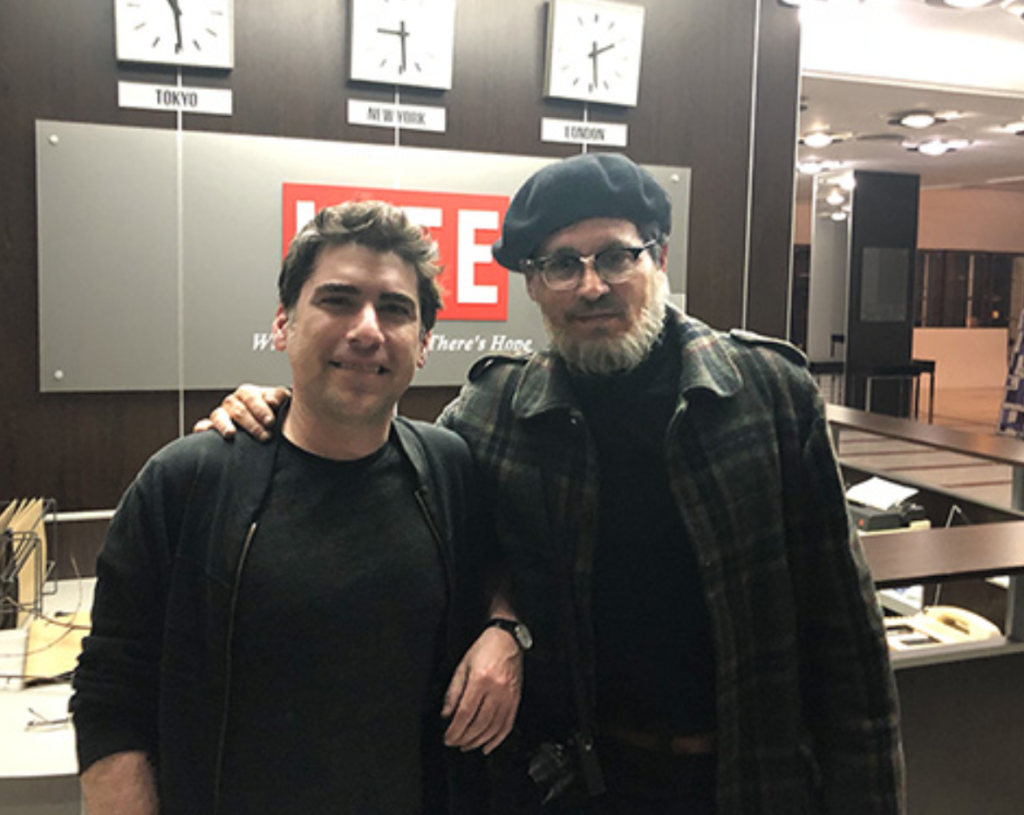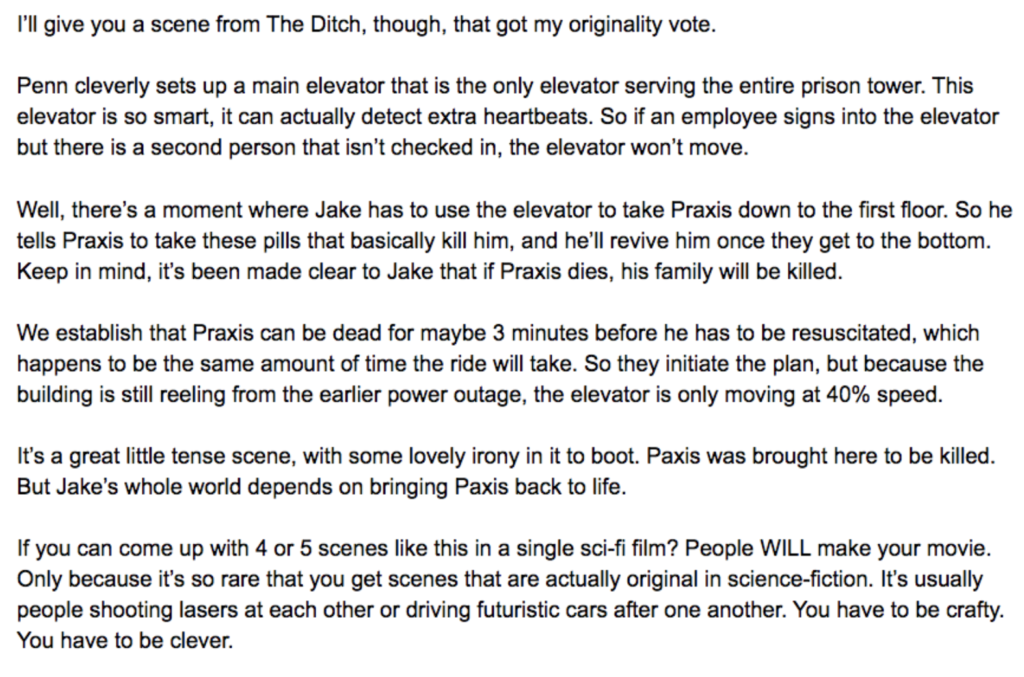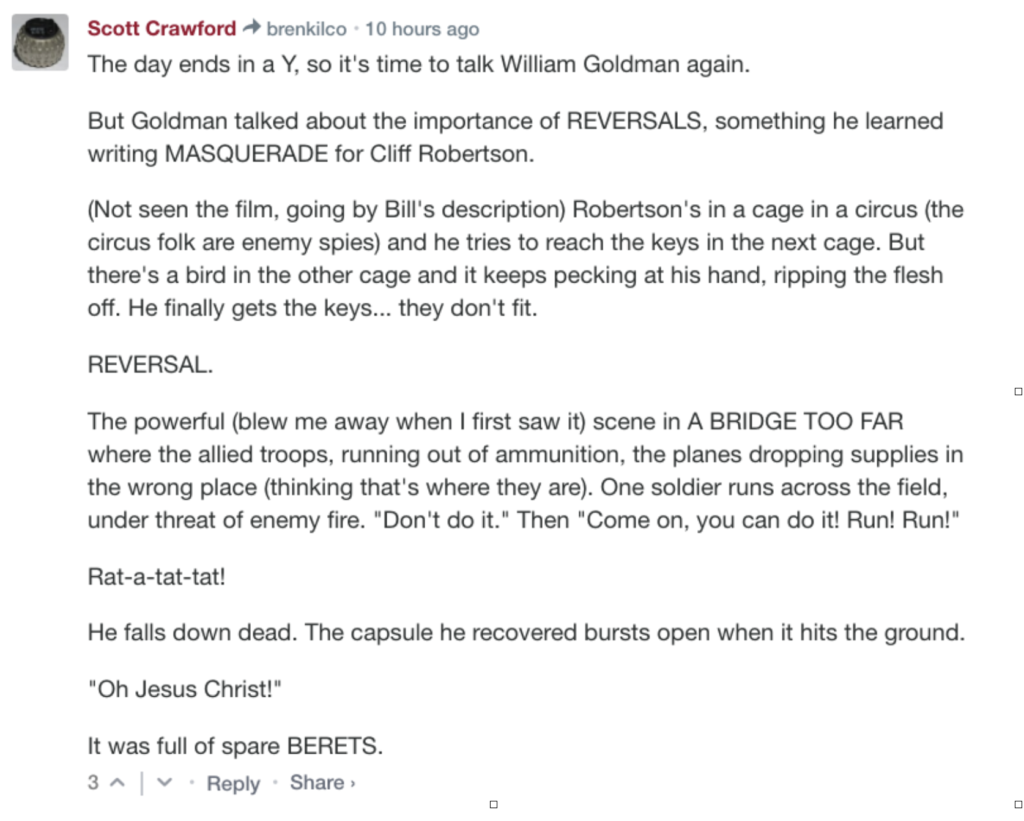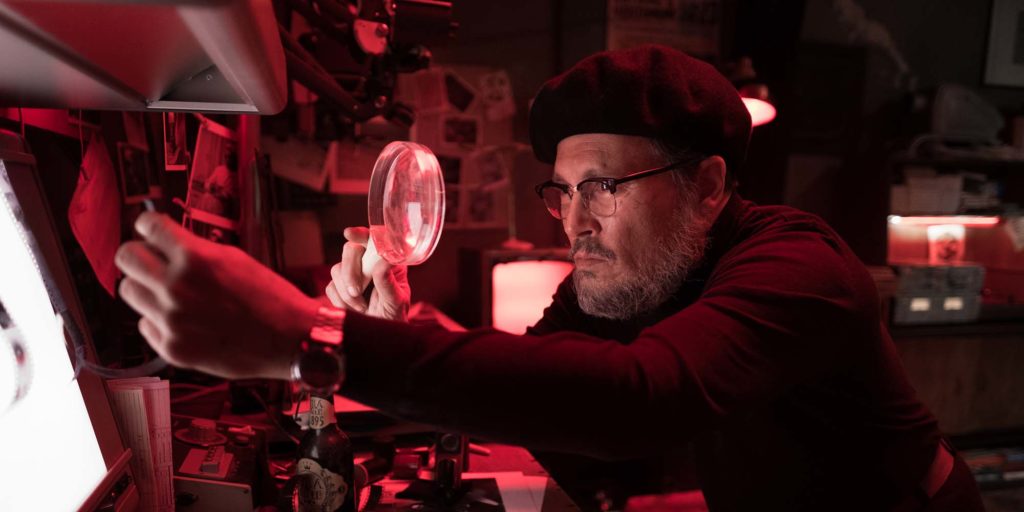
Today I have a special treat for you, an interview with David Kessler, the writer of the new Johnny Depp film, Minamata, which comes out this Friday! The movie follows photographer Eugene Smith, who famously documented the effects of mercury poisoning on the citizens of Minamata, Kumamoto, Japan. A little backstory on this one – I consulted on the script many moons ago for David. David kindly credits me for helping him get the script in shape for what would, ultimately, become his first major writing credit.
1) Let’s start with you, David. When did you start writing screenplays?
I started writing screenplays in the mid-’90s while living in New York and working for myself as a graphic designer and a copywriter (WFH waaaaaay before it was a thing.)
My first script was a biopic about the 1950’s doo-wop child star Frankie Lymon. I had tracked down the former members of his group, The Teenagers, who were also (still) living in New York and very much not teenagers anymore.
After I had finished spec’ing the Lymon story, it was announced that “Why Do Fools Fall In Love” was going to be made by the director of Selena, Gregory Nava, and that turned my screenplay into 120 pages of scrap paper.
2) Until the point when you wrote Minamata, how many screenplays had you written in total?
Five finished ones (the Lymon biopic, a terrible thriller I have little memory of, a coming-of-age adaptation of my terrible novel, a comedy based on dating, and a rom-com I re-wrote too many times for too long).
Plus 2 TV pilots, 4 TV specs (a Will & Grace, a Curb and two Seinfelds) and a short film. And a handful of feature treatments.
3) What would you say were a few of the most important screenwriting lessons you learned early on that allowed you to write such a good script in Minamata?
That you need to write bad scripts (see above) to get to good scripts. There are very few Sorkin-esque prodigies. It’s a craft. Your first chair is going to be a rickety bunch of wood but your 500th one will be much sturdier (and be worthy of selling).
And always be learning. I read your blog every day and still read screenwriting books and articles, watch YouTube videos about the craft, and screenshot little bits of advice I see on Twitter.
Plus, it may take a few genres / scripts to find what your “lane” is. Even though my first script was a true story / biopic, it took like 18 years to circle back to that niche.
Also, scripts and movies are supposed to make you FEEL something. If I didn’t scare you with a horror story or make you cry with my drama, I feel I failed.
And the bar is really, really high.
I once had a full-time job writing movie poster lines about 15 years ago – I read 2 to 3 scripts a day and these were things in production – Juno, Hancock, Enchanted, Stepbrothers – you realize you gotta be as good as the pros for studios to make your movie instead of Scott Frank’s or whomever’s.
Stepbrothers made me laugh so hard I couldn’t breathe in my cubicle (the testicles on the drums scene in particular). The Mist gave me nightmares after I had read it.
4) For my own egocentric needs, have there been any tips you’ve learned from the site in general that have helped you become a better screenwriter?
Oh tons — I bought your e-book years ago and I read the blog every day and screenshot a lot of your “what I learned”. And often go back through the archives. The Goal, Stakes, Urgency tip I come back to often and I even remember I think Jersey Shore was an influence on that somehow.
Here’s something I screenshotted back in 2017:

Another from the comments:

5) Now let’s get to the juicy stuff. Here on the site, I advocate for writing genre material with strong hooks. Minamata is a passion piece and, one would argue, the complete opposite of that. What advice would you give to someone who wants to write dramas or “low-concept” material? How do you write in this space and find success, like you did? Is there a game plan one can follow?
That’s hard to answer. Regarding the sale and having it been made, it’s like asking, “How do I win the lottery?” or “How do I find the love of my life?”
A lot of things need to fall exactly in place at the exact right time. I got very, very, very, very lucky.
Once I ran the numbers on the odds of my spec getting made with a movie star of Depp’s stature…I think the number came to .00004%.
I had caught Mrs. Smith (the widow of Gene Smith, who Depp plays in the film) at a time where she was willing to explore a movie deal again (she had been approached many times over the years and even had had meetings with Anthony Hopkins, Ang Lee and Scorsese in the ’80s or ’90s, with Hopkins to play her husband).
AND I had known a person from the comedy world from 13 years earlier who took the sketch class I had but the one right before mine but came to our class’s show – she gave it to her manager. This manager happened to have worked at a photo magazine in the 1970s, so the subject matter sparked her interest.
AND Johnny Depp knew of Gene Smith and admired him and his work because his friend, the late photographer Mary Ellen Mark, had taken Smith’s classes in the 1960s and had told Depp Gene Smith stories…
6) Quick question here: Did you know Depp liked Gene Smith ahead of time or was that pure coincidence?
That was a wonderful coincidence. I was told when Depp was in the office and the staff was updating him on the projects the company was developing, someone said, “Oh, it’s the story about this photographer named W. Eugene Smith who goes to — ” And Depp had (nicely) cut them off and said “I know who Gene Smith is.”
I had no idea about his relationship with Mary Ellen Mark or that she had taken classes from him, most likely at The New School, where I had gone to college.
7) Okay, got it. Continue…
All those people and moments had to have aligned for Minamata to get made (with Depp – see below for the attempted-Jeff Bridges path).
None of this is to say you shouldn’t write your passion project.
About half the projects on The Black List feel like passion projects (some have rights issues that inherently prevent a sale – like, say, the making of The Empire Strikes Back from the guy who played R2D2’s point of view or whatever.).
But they can attract attention. And demonstrate your ability and voice. I seem to recall getting some general meetings off Minamata before Depp’s company wanted it.
Being John Malkovich was probably a passion project / written to (further) showcase Charlie Kaufman’s unique voice. But then Spike Jonze asked his reps for the “weirdest script that could never get made” after he was sick of reading “regular” movie scripts. And Kaufman’s career took off.
So my point is, even if your script doesn’t get MADE, the script could MAKE YOU.

8) How does one get their script to an actor as big as Johnny Depp?
Through the normal, respected channels. My manager knew his “people”.
Someone took a recent script of mine (now granted, this person is married to a ridiculously famous person) and put it in the mailbox of their immediate neighbor, a famous actor, with a note. That didn’t work (despite them knowing each other).
But even if you don’t share a property line with a famous actor, don’t shove your script in their mailbox. It’s not how things are done.
But the Depp thing wasn’t a straight line. They initially passed but called back like 10 months later.
9) Okay, can you tell me about that? Did you find out the reasons why they initially passed? Was it one of those instances whereby the agent was making decisions for Depp and Depp never even knew about the submission?
Something like that happened with another project, but I didn’t find out what happened with Minamata until years later: The person at Depp’s company who had read it liked it and passed it up to his boss and they turned it down.
That first reader then later got a promotion and was offered to shepherd a project and he said, “I can’t stop thinking about that Minamata script.” And his boss said, “Well, if you feel so strongly about it, go for it.”
9) Also, I understand that you had Jeff Bridges attached for a while but that didn’t work out. What happened? Any cautionary advice you can give writers there?
Yeah, no one tells you this, but actors aren’t attracted to / “stick” to scripts – they are attracted and “stick” to directors who have a script or a project for them. They want to be directed. They want to work with the directors their peers have worked with (and maybe won their peers awards from working with those directors).
Look at Leonardo DiCaprio’s whole M.O. – for the last 20+ years he just exclusively works with A-LIST, top-shelf directors (Cameron, Eastwood, Allen, Scorsese, Nolan, Mendes, etc.). There’s no up-and-comers. He won’t “Bruce Willis” it with an up-and-comer like Tarantino like Bruce did with Pulp Fiction but he’ll sure work with him when he’s Tarantino.
On the “mailbox” script mentioned above, some big producers came aboard later and the first thing they did was go to directors they knew and to the reps of directors, not actors. The dream cast in our heads had to wait until a director was attached.
Scripts lead to producers which lead to directors which lead to actors which leads to studios / investors. All those elements are links in the chain.
So there were a few moments Bridges was interested, well, more like intrigued, but he wouldn’t budge if they wasn’t a director, even when there was a significant producer attached.
10) Okay, so did Depp only sign on when there was a director or did he come on first? (If he did sign on without a director, why do you think he went the opposite route of all these other actors you mention)?
The entire time the script was being developed at Infinitum Nil (Depp’s company), him starring was never discussed. And this was over a period of a year and half or more.
Now that I consider it, it may have been because there was no director attached.
And Depp himself did call director friends and associates and a cinematographer he had worked with for years to direct (him). He also hand wrote a note to another A-List actor / director to enroll him. Some responded to the material and Depp as Smith but had other professional and/or personal commitments.
When Andrew (Levitas) expressed an interest in directing it (I believe he was already attached as a producer), he and Depp met for a meeting that was supposed to be two hours which stretched into nine hours. I believe they talked about Smith, art, photography, visual touchstones, and their vision(s) for the material.
11) When did you find out that he was committing to star and what was that moment like?
I guess I found out when Andrew came aboard as a director — it was kind of stunning. Not only was I going to have a Johnny Depp movie — my first movie was going to be a Johnny Depp movie. I mean, I had grown up watching Edward Scissorhands, Gilbert Grape, Ed Wood, Blow, etc.
What was a particular thrill was, one of the producers (the original reader, Jason Forman — and later, another writer on it) sent me a photo of Depp in rough makeup at some point after that: a beard, a beret and holding a 35mm camera — Depp had had his makeup person do a test when there was a break in shooting something else.
I printed that out and tiled it so it was hanging over my bed, taped together in like 10 sheets of paper to remind myself it was real.
Still, I was always worried something would happen — like with financing or Depp’s schedule. You always hear about money falling through like with Dallas Buyers Club and other indie movies. I almost didn’t believe it was going to happen until I got paid and then like a couple weeks later was flying to Serbia, where we shot it.
12) Why do you think an actor such as Depp, who tends to be drawn to very interesting roles, liked this part so much? I guess I’m asking a bigger question here, which is: What kinds of characters are big actors interested in?
Smith was really in Depp’s wheelhouse – he was an artist to his core, rejected societal conventions, he had a fondness for drugs and alcohol (as did Hunter Thompson — who Depp played twice — and Jack Sparrow), and could be a real pain-in-the-ass and wasn’t afraid of making scenes but also had real heart. He was very larger-than-life.
But to your broader question: actors like playing interesting, complex, layered characters who say and do “cool” things. They love characters that are funny (Apatow characters), wicked smart (Imitation Game, The Social Network, Limitless, A Beautiful Mind, Good Will Hunting) – just memorable in some way.
13) Finally, is there some advice you can give from your personal experience that none of the film schools or screenwriting sites give on what it takes to get your script made into a movie? Does that “secret advice” exist?
There’s no secret – find unique ideas for movies (I just stopped working on 2 W.I.P.s when a recent collaborator / mentee of mine came up with a doozy and I pushed those two former ones hard to the side and I wrote the first act in 4 days), always be learning, find the HEART in your scripts / make me FEEL something, find and make friends in the same racket, read this blog, strive to be better – as good as the best, put yourself in a spot where you can be lucky and the odds can tilt slightly in your favor.
Minamata opens Friday in select theaters!

